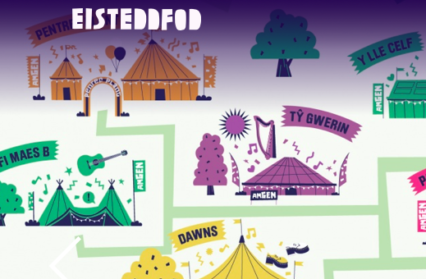In the midst of the second year of a virtual Eisteddfod Genedlaethol, Plaid Cymru’s culture spokesperson Heledd Fychan asks why the Welsh government isn’t making more of Wales’ rich cultural scene to promote tourism and contribute to the status of Welsh as a living language.
Thousands of people from across Wales, and indeed from across the world, should have been flocking to the Eisteddfod Genedlaethol in Ceredigion this week. I would have been one of them.
Sadly, instead, due to the Coronavirus pandemic, this will mark the second consecutive year without a “normal” National Eisteddfod.
The team behind Eisteddfod AmGen – the virtual incarnation of the Eisteddfod – are to be commended for another fantastic programme of cultural, literary, and live music events that will appeal to people of all ages.
However, despite the quality of the virtual offer, the cancellation of an in-person Eisteddfod has undoubtedly left a huge gap in Wales’ cultural calendar.
As one of the largest music and poetry festivals in Europe, the Eisteddfod plays an integral part in our nation’s cultural life. This is reinforced by the fact that it moves to a different part of Wales every year, meaning that different communities can get involved in each Eisteddfod. This makes each one unique and leaves a lasting legacy in those communities for years to come.
The Eisteddfod is about tradition. It’s about heritage. It’s about promoting and embracing y Gymraeg – our Welsh language. But, as it’s evolved in recent years, it’s also more and more about celebrating Wales, and the diversity of Wales, and becoming a festival that everyone in Wales can be proud of, whether they speak Welsh or not.
And personally, I believe there is greater scope to market the festival internationally – ensuring the best of Welsh culture can be seen and celebrated on a global scale. Welsh Government and Visit Wales are, in my view, yet to understand and appreciate it’s potential and adequately support the National Eisteddfod to achieve this.
Reflecting on this led me to a wider question – how can we look to embrace and promote Welsh culture, heritage and the Welsh language internationally in a way that is sustainable, and works both for Wales and for our communities?
Take the recent decision by UNESCO to award the Slate Landscape of north-west Wales the prestigious status of World Heritage site as an example.
Formally recognising the slate industry’s contribution to north Wales is not only a fitting tribute to the labour of thousands of workers over many generations, who cut slate by hand in often life-threatening conditions for very little return, but it also ensures that future generations from around the world are given the opportunity to learn and understand the historical, industrial, economic, and cultural impact the slate industry made to Wales and beyond.
However, an award alone will not achieve this. We also need Welsh Government to take a more proactive approach to promoting our heritage, both within Wales and beyond. To date, other UNESCO sites in Wales have, in my view, been under-promoted and their potential under-utilised. We urgently need a sustainable tourism strategy which has at its core Wales’ rich history and culture.
Such a strategy would help with the issue of holiday homes in Wales, which of course is an issue that concerns many communities at present. It should focus on encouraging tourist enterprises which provide maximum benefit to local communities rather than extractive tourism that sees Wales as a resource to be exploited by outside interests. It should also include ways of increasing local ownership and control of the industry.
Heritage tourism is the most popular and traditional form of tourism in Wales where tourists are exposed to history through museums and heritage sites. But there is an argument to shift towards cultural tourism which can significantly contribute to the status of Welsh as a living language. Cultural tourism also promotes our diverse Welsh culture to the world. This shift has been popular and successful in Ireland where tourism has centred on music and literary festivals and food. We can and should do the same.
After all, Wales has so much to offer those that live here, and visit. Let’s have the confidence to embrace everything we have to offer, in a way that works for Wales.
Heledd Fychan is Plaid Cymru’s Spokesperson for Culture.
National Eisteddfod National Eisteddfod











